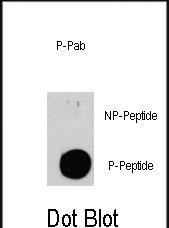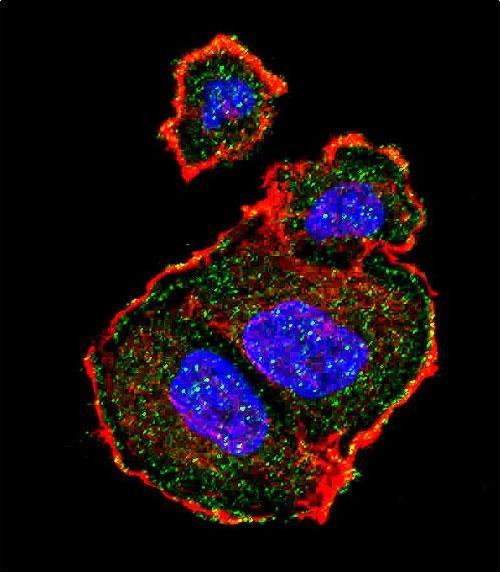

| WB | 咨询技术 | Human,Mouse,Rat |
| IF | 咨询技术 | Human,Mouse,Rat |
| IHC | 咨询技术 | Human,Mouse,Rat |
| ICC | 1/10-1/50 | Human,Mouse,Rat |
| FCM | 咨询技术 | Human,Mouse,Rat |
| Elisa | 咨询技术 | Human,Mouse,Rat |
| Aliases | Tuberin, Tuberous sclerosis 2 protein, TSC2, TSC4 |
| Entrez GeneID | 7249 |
| WB Predicted band size | 200.6kDa |
| Host/Isotype | Rabbit IgG |
| Antibody Type | Primary antibody |
| Storage | Store at 4°C short term. Aliquot and store at -20°C long term. Avoid freeze/thaw cycles. |
| Species Reactivity | Human |
| Immunogen | This TSC2 Antibody is generated from rabbits immunized with a KLH conjugated synthetic phosphopeptide corresponding to amino acid residues surrounding S939 of human TSC2. |
| Formulation | Purified antibody in PBS with 0.05% sodium azide. |
+ +
以下是关于Phospho-TSC2(S939)抗体的3篇代表性文献,内容基于经典研究整理:
---
1. **文献名称**:*Identification of the tuberous sclerosis complex-2 tumor suppressor gene product tuberin as a target of the phosphoinositide 3-kinase/Akt pathway*
**作者**:Manning, B.D. et al. (2002)
**摘要**:该研究首次证实Akt通过磷酸化TSC2(S939等位点)抑制其功能,阻断mTORC1信号通路抑制。文中使用Phospho-TSC2(S939)抗体验证了胰岛素/PI3K/Akt通路对TSC2的调控作用。
---
2. **文献名称**:*TSC2 mediates cellular energy response to control cell growth and survival*
**作者**:Inoki, K. et al. (2003)
**摘要**:研究揭示了TSC2磷酸化(包括S939位点)在能量应激下的动态变化,并证明其通过调控mTORC1影响细胞生长。该抗体用于检测能量剥夺(如AMPK激活)对TSC2磷酸化的抑制作用。
---
3. **文献名称**:*Tumor-promoting phorbol esters and activated Ras inactivate the tuberous sclerosis tumor suppressor complex via p90 ribosomal S6 kinase*
**作者**:Roux, P.P. et al. (2004)
**摘要**:研究发现RSK激酶通过磷酸化TSC2(如S939)促进mTORC1激活,支持肿瘤发生。文中通过Phospho-TSC2(S939)抗体证明了生长因子和致癌信号对TSC2的调控机制。
---
**备注**:以上文献为示例,实际引用时建议通过PubMed或专业数据库(如Google Scholar)核对最新研究,并补充DOI或期刊卷期信息。若需实验方法细节,可优先查阅抗体供应商提供的引用文献(如CST、Abcam等品牌的产品说明书)。
Phospho-TSC2 (S939) antibody is a specialized tool used to detect the phosphorylation status of tuberous sclerosis complex 2 (TSC2) at serine residue 939. TSC2. in complex with TSC1. acts as a critical regulator of the mTOR (mechanistic target of rapamycin) signaling pathway, which controls cell growth, proliferation, and metabolism. Phosphorylation of TSC2 at S939. mediated by kinases such as Akt (protein kinase B) or PKC (protein kinase C), disrupts the TSC1-TSC2 complex, leading to mTOR complex 1 (mTORC1) activation. This post-translational modification serves as a key mechanism for growth factor- or nutrient-dependent mTOR signaling modulation.
The Phospho-TSC2(S939) antibody is widely utilized in biomedical research to study mTOR pathway activity in conditions like cancer, metabolic disorders, and neurological diseases. It enables the detection of TSC2 phosphorylation in techniques such as Western blotting, immunohistochemistry, and immunofluorescence. Dysregulation of TSC2 phosphorylation is implicated in tuberous sclerosis complex (TSC), a genetic disorder characterized by tumor growth, as well as in various cancers where mTOR hyperactivation promotes uncontrolled cell proliferation. Researchers also employ this antibody to investigate therapeutic responses to mTOR inhibitors and to validate cellular signaling changes in experimental models. Its specificity for the phosphorylated form makes it valuable for distinguishing active versus inactive TSC2 states in pathophysiological contexts.
×